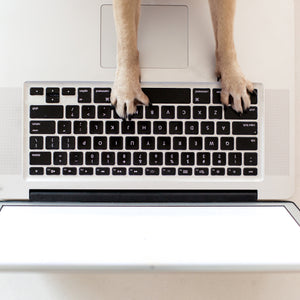Loss of appetite is sometimes the first sign that a dog is unwell and can be an early symptom of a potential illness. The first thing you must do is get your pet checked out by your vet, as a prolonged loss of appetite should never be ignored. A general examination and health check will flag up any concerns for investigation.
Are there any other clues that indicate your dog could be ill? For example, has your dog been drinking more than usual or vomiting? Have they seemed unsettled or struggled to go to the toilet? Are they happy to eat treats and scraps but just not want their usual dinner?
Your vet will want as much information as possible in order to build up a picture of your pet’s overall health. If no medical reasons for loss of appetite can be found, you can start looking for other reasons why your pet has decided not to eat.
Dental problems
A dog suffering from tooth pain or mouth discomfort will have trouble eating, and a dental examination by your vet will reveal any issues here. It could be that your dog needs a tooth extracted or an infection treated. Good dental hygiene and regular brushing is an important element of a pet care routine to prevent tooth decay.
If your dog is struggling to eat following an extraction, they might need to be moved on to a softer food that is easier to eat or have their normal kibble softened by pre-soaking it in some water.
Changes in environment
Have you moved the location of your dog’s food bowl or has something been moved near to their bowl that they are worried about? When was the last time you gave your dog’s food bowl a good clean? Is the food you are feeding still nice and fresh, and have you checked the expiry date? Are there any strong smells in the area where your dog eats that could be putting them off?
Play detective and have a good think about any changes in your dog’s feeding environment that could have made them not want to eat.
Food sources
Do you know exactly what your dog is eating? Is there a way they could be getting hold of extra food, which is perhaps making them less interested in their dinner? Is someone being a bit too generous with the treats or sneaking them leftovers after meals?
Has your dog learnt that if they don’t eat their dinner, they’ll be offered something tastier and more exciting in an effort to get them to eat? It could be that they are just holding out for something better!
Stress
If your dog is suffering from anxiety, they may not want to eat. For example, if they are noise-phobic they might not want to eat during a thunderstorm, or if they have separation anxiety, they may not want to eat when you’re not home. Do you have people staying with you or other animals in the house that your dog is not used to? Anything unsettling, or changes to a dog’s routine, could put them off eating.
What to do if your dog won’t eat
Here are some tips to get your dog eating if they’ve already been checked over by a vet:
- Your dog may just be bored of their usual food. You could try switching brands but consult your vet before making any dietary changes.
- Make sure you’re not feeding too many treats or table scraps. Try keeping high-calorie treats for training sessions and don’t feed any leftovers.
- Sometimes warming up your dog’s food can make it more appealing. You could add a little warm water to take the chill off, which will make it more appetising on cold days.
- Will your dog take food from your hand? Sometimes hand-feeding a bit of kibble to start with will be enough to whet their appetite and get them going on their dinner.
- Make sure your dog is getting the right amount of exercise for their needs so they build up a good hunger at meal times.
- Never punish your dog for not eating as you can increase their anxiety and exacerbate any issues around food. Be patient, kind and don’t use force.
- Most dogs can go three to five days without eating but water intake is a bigger concern. A dog that has gone just a day without water can become seriously dehydrated so make sure you monitor your pet and seek veterinary advice immediately if they stop drinking.
If you found this article interesting, you may like:




